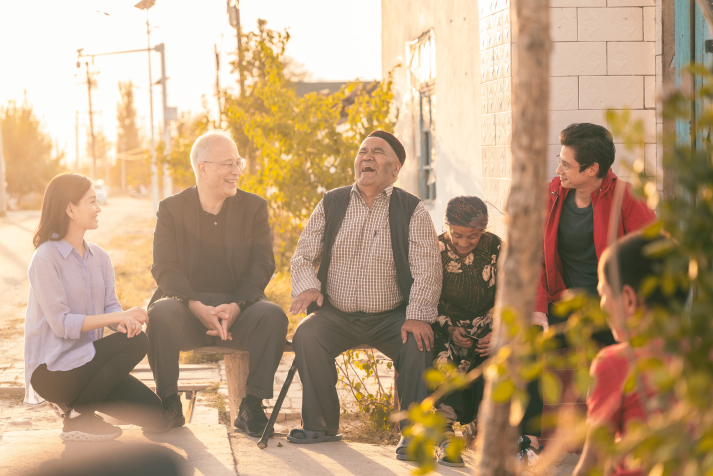| Lifestyle |
| Middle-class aspirations | |
|
|
 Einar Tangen (second left) and media representatives from the Miao Xiaojuan Studio talk with a family in Kashi Prefecture, Xinjiang Uygur Autonomous Region, on September 20, 2021 (XINHUA)
In September 2021, I traveled to Xinjiang Uygur Autonomous Region for the second time, the first being in 2014, in the midst of turmoil due to separatists. I was able to talk to people and we didn't talk to the people that the local government wanted us to talk to. We talked to people straight off the street. We even followed somebody home from the maternity hospital. The proud parents had two sons but longed for a daughter. Both were only intermittently employed and lived with the husband's family. They had paid 320 yuan ($50) for the entire delivery process at a newly opened hospital. The smile on the proud grandfather's face and the looks of his shy but inquisitive grandsons as they greeted the newest addition to the family, a granddaughter, is something that will remain inscribed in my mind. My visit also helped debunk the false narratives about an area and people in fear, where mothers are forced to have abortions, where daughters are unwanted and where people are locked up, tortured and killed in "concentration camps." We went to their home twice, once in the evening and once more during the day, to record the family's joy when the "gift," which is what they named her in Uygur, came home for the first time. I also interviewed a woman who was pushed by her family to get help at a training center after her father passed away. She had been convinced by an acquaintance that unless she stopped working and embraced the Wahhabist version of Sharia (Islamic law), her father would go to hell. The centers were set up to contain and remedy the dissemination of religious extremism and frequent terrorist incidents. All trainees had graduated by October 2019. She had been a kindergarten teacher, and at the training center, her talent as a performer was recognized and she is now the star of the daily show that welcomes tourists to the ancient city of Kashi (Kashgar). In talking to her, one could not help noticing that it was as if she was talking about a different person when she told the story of her past. There were other activities in the towns and cities of Xinjiang, but they all spoke to the same thing: It was about Chinese people going about their daily lives, working, playing and pursuing their dreams. We watched local election preparations and then watched as people cast their ballots for the people they wanted to represent them. We talked to five candidates who were competing for four positions on the village board. Noticeably, no candidate made election promises or attacked the other candidates. Each just talked about what they had done and their desire to serve. We then walked around the village and asked random people if they knew the candidates, to which they all answered "yes." "People know who they are, and we believe they have the desire and ability to help the village," they said. I noted there weren't any election posters or yard signs. When I asked why, the answer I got was: People don't do that, and it wouldn't do any good because if people did not know the people running and their characters, they would not vote for them. In terms of the people we talked to, about 50 percent were random people we stopped and asked questions of. What became clear was that people's minds were not on politics but the realities of their lives, economic opportunity, access to medical care and their families. The attitudes and aspirations of the people we interviewed were the same as the middle-class attitudes and aspirations of those in the developed world: making money to pay for their children's university educations, vacations, cars, houses, savings, access to good medical care and how to take care of their elders. The 20 hours I spent traveling through Kashi, where most residents are Uygur, revealed a normal community where children played in the lanes, the corn was dried on the roads, and people went about their lives, not consumed by fear, but with a desire to improve their families' futures—a depiction, which is not just the story of Kashi or Xinjiang, but all of China. BR The author is a senior fellow at the Beijing-based Taihe Institute think tank. He is also an independent economic and political affairs commentator Comments to linan@cicgamericas.com |
|
||||||||||||||||||||||||||||
|